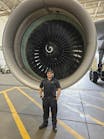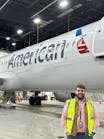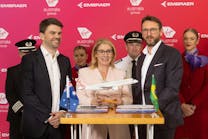Joint Comments Opposing the Application of Norwegian Air UK Limited for a Foreign Air Carrier Permit
For the last two years TTD has been part of a broad coalition of aviation unions and airlines in the U.S. and Europe committed to preventing Ireland-based Norwegian Air International (NAI), a subsidiary of Norwegian Air Shuttle, from gaining illegal access to the U.S. market. As we have shown in extensive public comments to the DOT, NAI is a flag of convenience airline and its employment model violates the terms and conditions of the U.S-EU Open Skies Agreement. The DOT has yet to make a final determination on NAI’s application. Norwegian Air Shuttle has now created a new airline, Norwegian Air UK Limited, which filed for a foreign are carrier permit with the DOT on December 11, 2015. While the application is scarce on details, this is a continuation of Norwegian’s efforts to introduce a flag of convenience airline into the transatlantic marketplace. Attached is the joint answer of the Air Line Pilots Association (ALPA), Transportation Trades Department, AFL-CIO (TTD), Transport Workers Union of America, AFL-CIO (TWU), Association of Flight Attendants-CWA (AFA-CWA), International Association of Machinist and Aerospace Workers (IAM), and European Cockpit Association opposing this request, and urging the DOT to request additional information from NAUK about its employment and business models.
The undersigned labor organizations (“the Labor Parties”) at this juncture oppose the application of Norwegian Air UK Limited (“NAUK”) for a foreign air carrier permit. NAUK is a wholly‐owned subsidiary of Norwegian Air Shuttle (“Norwegian”) that has been established, in part, to provide long‐haul service from European points to points in the United States. In these respects, NAUK is similar to Norwegian Air International (“NAI”), another subsidiary of Norwegian. The Labor Parties have challenged NAI’s application for an air carrier permit on the grounds that because of NAI’s employment model for its pilots and flight attendants, approval of its application would be incompatible with the provisions of Article 17 bis of the U.S.‐European Union Air Transport Agreement (“ATA”).3 While NAUK’s minimalist application does not disclose what the applicant’s plans are with respect to employment of the pilots and flight attendants who would staff its long‐haul operations, it is possible that NAUK intends to use the same model employed by NAI. Therefore, before deciding how to act on NAUK’s application, DOT should require NAUK to provide responses to the information and document production requests attached to this Joint Answer and allow interested persons a reasonable time to comment on NAUK’s application once those responses are submitted.
DISCUSSION
The record in the NAI proceeding shows that NAI is staffing its long‐haul flights with flight crew based in Thailand and employed by non‐European crew supply companies on employment contracts governed by Asia law: Singapore law in the case of pilots and Thailand law in the case of flight attendants. The record in that case further shows the terms and conditions of employment for those pilots and flight attendants are substantially inferior to those that apply to pilots and flight attendants employed directly by Norwegian or its subsidiaries. The Labor Parties showed that granting NAI either an exemption or a foreign air carrier permit would be inconsistent with the public interest standards set out in the aviation statutes and the provisions of the ATA, in particular, Article 17 bis.4 NAUK’s application contains no information as to the employment arrangements that will apply to the pilots and flight attendants who will staff the aircraft that NAUK intends to use to serve the U.S. NAUK may plan to hire those pilots and flight attendants directly; it may plan to contract them from a UK hiring agency; or it may plan to contract them from non‐EU hiring companies that employ the pilots and flight attendants on extra‐European contracts, as it is currently done by Norwegian and NAI.
This ambiguity is highlighted by how Norwegian has staffed its UK operations at Gatwick to date. To staff its Gatwick Boeing 737 operations Norwegian has contracted for a number of pilots who are employed by OSM Aviation (“OSM”) and based in London. OSM has signed a recognition agreement covering those pilots with the British Air Line Pilots Association (“BALPA”) and has engaged in negotiations with BALPA over the employment terms that will apply to them. Some months ago BALPA was led to believe by OSM and Norwegian that the pilots who are to operate NAUK’s Boeing 787s – including NAUK’s 787 service to the US – would also be based in London, employed by OSM, and covered by the recognition agreement. To date, that has not happened, and Norwegian, NAUK and OSM have not made clear the hiring and basing plans for the 787 pilots. A similar structure exists with respect to flight attendants: OSM has a recognition agreement with labor union Unite for the London‐based flight attendants who work on Norwegian’s Gatwick 737 flights, but it is not clear whether the flight attendants who are to staff NAUK’s Gatwick 787 flights will be covered by that agreement.
CONCLUSION
NAUK’s application raises serious questions about whether its business plan is consistent with the public interest and the U.S.‐EU ATA. In order to clarify NAUK’s staffing plans for its services to the U.S., DOT should seek the additional information specified in the attached information request, and interested persons should be given a reasonable opportunity to respond to that information before the Department acts on NAUK’s application.


